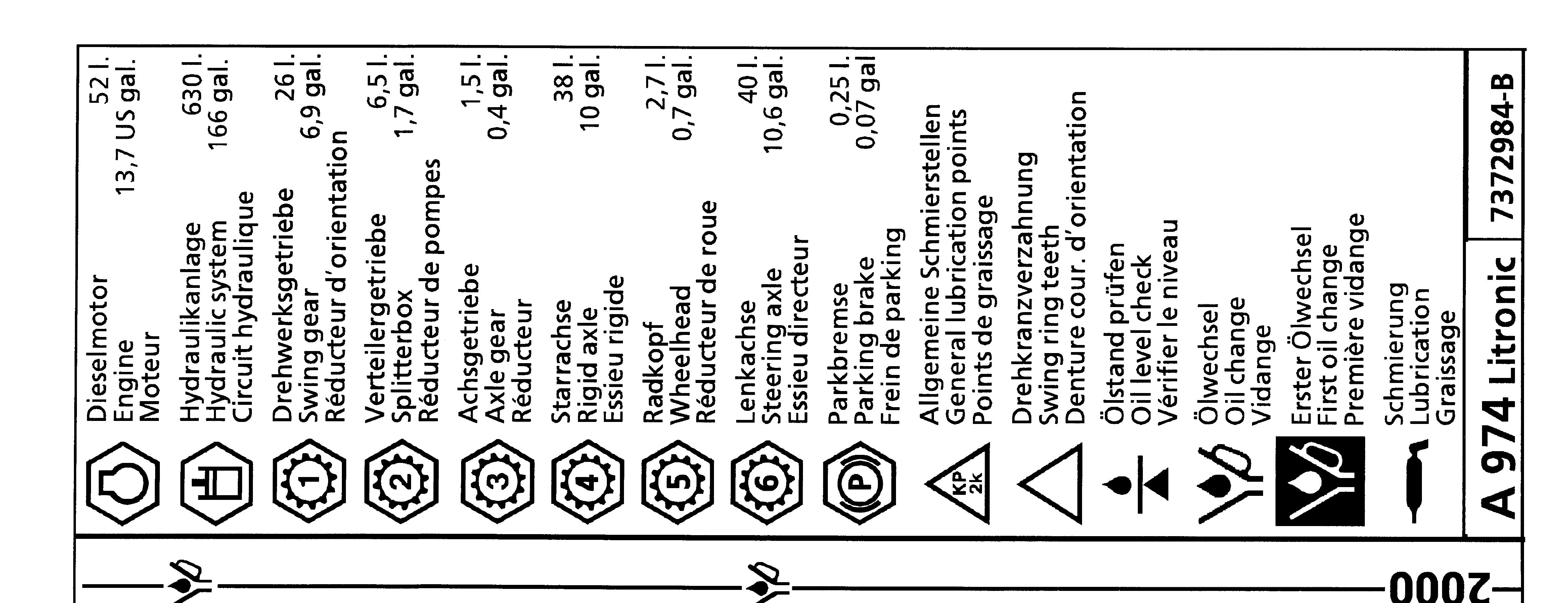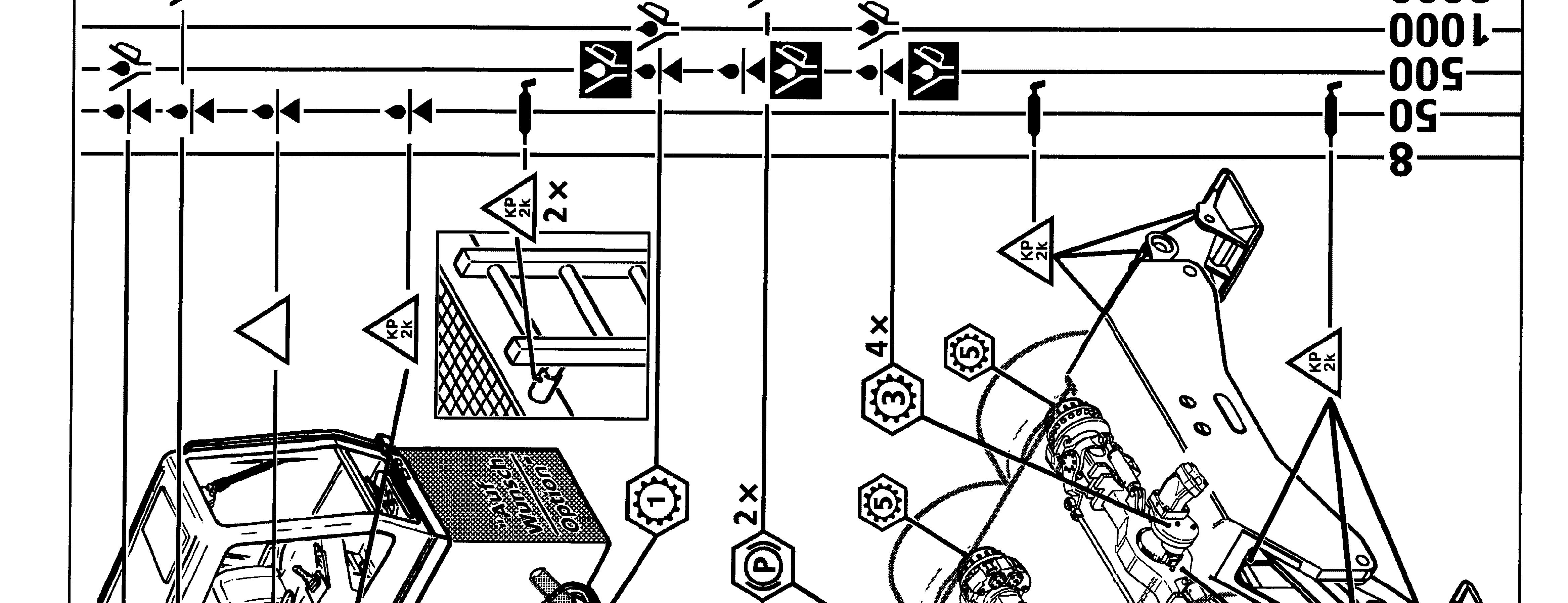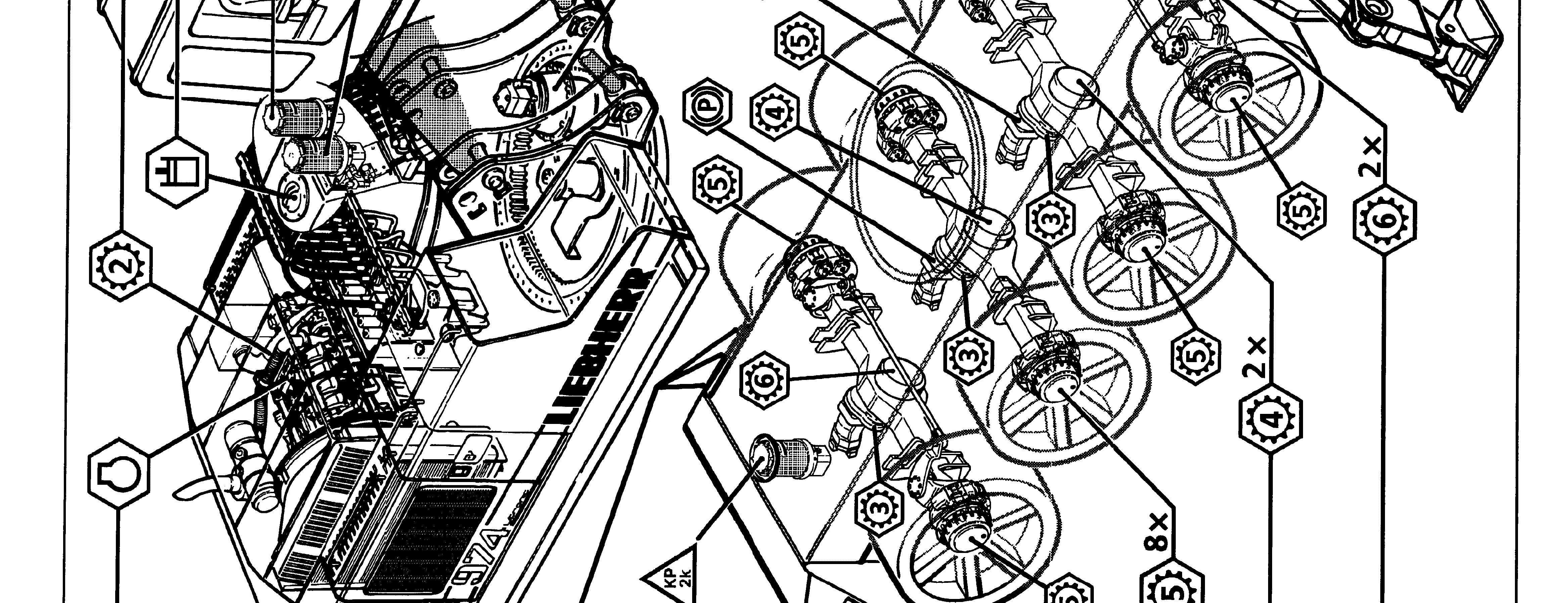
8 minute read
LUBRICANTS AND FUEL SPECIFICATIONS
Notes On Lubricant And Operating Materials Chart And On Lubrication Schedule
The amounts indicated on the lubricant and operating materials chart and on the lubrication schedule located in the operator's cab are guidelines. Check level in appropriate aggregate after every oil change or refill.
1) DIESEL ENGINE LUBRICANTS:
Lubricant regulation for diesel engines is based on the following specifications and regulations:
API - Classification :CG-4, CF-4
(American Petroleum Institute)
ACEA (CCMC) - Classification :E2-96, E3-96, (D4, D5), E4-98 (Association des Constructeurs Européens de l'Automobile).
Intervals for Oil Change
First oil and filter changes: at 50 - 100 operating hours when using running in oil (Engines delivered ex works up to 12 - 99). at 500 operating hours when using oils satisfying lubricant regulations (Engines delivered ex works since 01 - 2000).
Further filter changes every 500 operating hours and oil change depending on climate zone, sulphur content in fuel and oil quality according to sulphur chart below
If indicated operating hours are not reached, change engine oil and filter at least once a year.
Oil change intervals in operating hours :
2) DIESEL FUEL: Authorized Diesel fuel specifications
DIN EN 590l
ASTM D 975-89a: 1-D and 2
The sulphur content in Diesel fuel should be less than 0.5%. Higher sulphur contents influence oil change intervals and engine life.
Lubricity
By reducing sulphur content, the question of engine fuel lubricity arose. It has been clearly shown that engine fuels with the maximum allowable sulphur content (in Europe 0.05% by weight) can cause damage to the injector systems (especially in the case of distributor injection pumps).
Improving Diesel fuel fluidity in cold climates
Addition of regular gasoline or kerosene:
When ambient temperature are below 0 °C (32 °F), Diesel fuels normally used during the summer may suffer a decline in fluidity due to paraffin separation. The same occurs if Diesel fuels normally used during the winter are used at temperature below -15 °C (5 °F).
Often, additive diesel fuel is on offer with operating temperatures down to -20°C (-4 °F).
In order to prevent operating problems at these low temperatures, the Diesel fuel must be mixed with regular gasoline or kerosene (lamp oil).
Mixing regular gasoline should be considered at last resort, under no circumstances should the ratio of gasoline exceed 30%.
Never use super grade gas for mixing.
* If an additive of 50% is necessary, only use petrol (no normal gas).
Depending on the ratio of Diesel fuel to gasoline or kerosene, engine output may somewhat decline.
Depending on the ambient temperature, add as little gasoline or kerosene as possible to the Diesel fuel.
Other Fuel additives (flow improvers):
Widely available flow improvers also enhance Diesel fuel ability to perform reliably in cold climate conditions. When using such flow improvers, follow the manufacturer's recommendations closely.
3) ENGINE COOLANT - Specifications for anticorrosion and antifreeze protection
Using a mixture of antifreeze and anticorrosion with "DCA 4" anticorrosion additive.
To assure the protection from corrosion of the cooling system, the coolant must contain at least 50% corrosion / antifreeze mixture all year round. This protects the cooling system to about - 35° C ( - 33° F).
When fluid is added to the coolant mixture, it must be assured that the mixture maintains a 50% antifreeze content.
Caution : The percentage of antifreeze should not exceed 60 % . A higher concentration would lead to reduced antifreeze and cooling properties.
In addition, the cooling system must contain DCA4 (DCA = Diesel Coolant Additive) from FLEETGUARD. The prescribed concentration is from 0.3 to 0.8 DCA units per liter of coolant (1.2 to 3.0 units per US Gallon).
The coolant must be changed every 2 years. Before adding new coolant, check the circuit for cleanness and if necessary flush it with water.
Using a mixture of water and DCA4 (without antifreeze and anticorrosion)
In certain circumstances, and if ambient temperatures are constantly above the freezing point, for instances in tropical regions, and if there are no corrosion or antifreeze fluids available, then a mixture of water and DCA4 additives may be used.
To maintain sufficient anticorrosion properties however, the DCA4 concentration of the coolant must in this case be about doubled in comparison with the one prescribed when using a mixture also containing antifreeze and anticorrosion, it equals a concentration from 0.6 to 1.6 DCA units per liter of coolant (2.4 to 6.0 units per US Gallon) .
Important !
If employing a mixture consisting only of water and DCA4 additives : the use of coolant refiners (corrosion protective oils) is not authorized, the coolant change interval must be reduced to once a year.
Checking and maintaining the right DCA4 concentration in the cooling circuit
To check the DCA4 concentration, we recommend the use of the test kit CC 2602 M from FLEETGUARD (LIEBHERR order No 5608459).
The water filter mounted in the cooling circuit contains from 4 up to 8 DCA4 units, see the following schedule. When changing the filter, the corresponding units are added to the cooling circuit.
If there are no significant coolant leakages, regularly replacing the water filter every 500 working hours is sufficient to maintain the correct concentration of anticorrosive agent.
The DCA concentration has to be checked before each filter change, after each important coolant make up, and at regular intervals if smaller coolant quantities are refilled frequently.
If the concentration is too low, or when changing the coolant in the system, the remaining necessary DCA4 units must be added to the system in liquid form (see schedule).
The LIEBHERR order number for a 0,5 liter can containing 5 DCA4 units is 7363898..
DCA4-Water
(1) For use with a mixture containing 50% antifreeze and anticorrosion
Fresh water guidelines:
To mix the coolant fluid, only clean, preferably soft water should be used. Often, but not always, regular drinking water can be used. Sea water, brackish waters, sole water or industrial waste water may not be used.
Fresh water quality
Sum of alkalies (water hardness) 0,6 to 2,7 mmol/l (3 to 15°d) * ph value at 20° C ( 68° F) 6,5 to 8,0
Chloride - ion content max. 80 mg/l
Sulfate - ion content max. 80 mg/l
* 1° dGH (total hardness - germany) = 1,2° (englisch hardness) = 17.9 ppm (US hardness)
The following corrosion and antifreeze fluids may be used: Brand Manufacturer
Agip Antifreeze Plus
Agip Langzeit-Frostschutz
Antigel DB 486
Aral Kühler-Frostschutz A
AVIA Frostschutz-APN (G48-00)
BP anti frost X 2270 A
BP Napgel C 2270/1
Caltex Engine Coolant DB
Agip Deutschland AG, München - Germany
Autol Werke Gmbh Würzburg - Germany
Sotagral SA, St. Priest / France
Aral AG, Bochum - Germany
Deutsche AVIA-Mineral-Oel AG München - Germany
Deutsche BP AG, Hamburg - Germany
BP Chemicals Ltd, London / England
Cultex (UK) Ltd, London / England
Deutsche Castrol Vertriesges. mbH, HamburgGermany
Castrol Anti-Freeze O
Century F.L. Antifreeze
DEUTZ Kühlmittelschutz 0101 1490
Esso Kühlerfrostschutz
Fricofin
Frostschutz Motorex G 48-00
Frostschutz 500
Glacelf
Century Oils, Hanley, Stoke-on-Trent / England
DEUTZ Service International, Cologne - Germany
Esso AG, Hamburg - Germany
Fuchs Mineraloelwerke GmbH, Mannheim - Germany
Bucher & Cie, Langenthal / CH
Mobil Oil AG, Hamburg - Germany
Elf Mineraloel GmbH, Düsseldorf - Germany
Glycoshell AF 405 Shell
Glycoshell N Shell
Glysantin (G 48-00)
Igol Antigel Type DB
BASF AG, Ludwigshafen - Germany
Igol France, Paris / France
Labo Labo Industies, Nanterre / France
Motul
OEMV-Frostschutzmittel
OZO Frostschutz S
Total Antigel S-MB 486
Total Frostfrei
Veedol Antifreeze O
4) HYDRAULIC OIL :
Hydraulic oil specifications
1. Mineral oils
Motul SA, Aubervilliers / France
OEMV-AG, Schwechat / Austria
Total Deutschland Gmbh, Düsseldorf - Germany
Total Deutschland Gmbh, Düsseldorf - Germany
Total Deutschland Gmbh, Düsseldorf - Germany
Deutsche Veedol GmbH, Hamburg - Germany
Recommended and approved are engine oils, which conform to the following specifications
For single viscosity oils API - CD / CCMC- D4 / ACEA - E 1
Mercedes-Benz specifications -page No 226.0 and 227.0
For multi viscosity oil : API - CD +SF / CCMC - D5 / ACEA - E3
Mercedes-Benz specifications -page No 227.5, 228.1 and 228.3
2. Environmentally friendly hydraulic fluids (also called "BIO oils" -biodegradable oils-)
The "environmentally friendly hydraulic fluids" recommended by LIEBHERR are limited to synthetic ester based hydraulic fluids with a viscosity according to ISO VG 46.
Initial filling is performed ex works according to customer desires.
The use of environmentally friendly hydraulic fluids must be arranged with the LIEBHERR Co beforehand.
Organic oils should not be used due to their poor temperature consistency.
Notes: It is absolutely necessary never to mix different brands of environmentally friendly hydraulic fluids or to mix fluids with mineral oils.
For further information on operating while using environmentally friendly hydraulic fluids, see page 8.7.
Hydraulic oil change intervals
1. Oil changes in pre-set intervals
Note: Oil changes in pre-set intervals are only permitted for mineral oils. When using environmentally friendly hydraulic fluids, oil sample analysis reports must be used to determine the time of the oil change, see §2 a) in
2. Optimised oil change intervals determined through oil sample analysis reports.
Use this procedure to take oil samples in pre-set intervals. The intervals may be extended between two oil changes as long as the properties of the oil are still satisfactory. The time when the oil must be changed is determined by the lab report.
LIEBHERR recommends to submit the oil samples to "WEAR- CHECK" for oil analysis. A kit for 6 complete analysis at WEAR - CHECK is available : Id. No. 7018368 (The kit contains the sample containers, documentation, shipping container and oil sample hose). A hand pump is required to take the oil sample, and should be ordered separately (Id. No. 8145666).
To limit the hydraulic oil contamination when working under extreme dusty conditions
On excavators working under very dusty conditions or with a hydraulic hammer attachment, the contamination of the hydraulic oil may be significantly increased. In order to avoid any premature wear and failure of hydraulic components in consequence of this contamination reduce the oil change intervals as described above and, in addition, observe following recommendations:
The tank return filter element(s) must be replaced every 500 operating hours. The tank return filter must be fitted with lower (finer) micron filter element(s) (10 µm instead 20 µm element, serially mounted).
The breather filter on the hydraulic tank (fineness of serially mounted filter is 10 µm) must be replaced with a 3 µm fine breather filter. This 3 µm breather filter must be replaced every time the hydraulic oil is changed (every 500 operating hours).
Notice: The excavators delivered from factory with a hydraulic hammer attachment are fitted with the fine 10 ?m return filter element(s) and with the 3 ?m fine breather filter. The kit for retrofit installation of a hydraulic hammer also contains these fine element(s).
5) GEAR OILS
Gear oils for viscosity classification SAE 90 must meet the specifications API-GL-5-90 and MIL - L 2105 B, C or D.
For SAE 90 viscosity, SAE 80W90 can also be used.
6) GREASE FOR SWING RING ROLLER RACES AND GENERAL LUBRICATION POINTS
This grease must meet specifications, consistency classification 2 in NL-GI viscosity per DIN 51 818 and DIN 51 825 or EP2 per NF-T-60 132. The grease must be lithium-complex based, with VKA value of at least 2300 N per DIN 51350 or ASTM D 2596.
GREASE FOR AUTOMATIC LUBRICATION SYSTEM
For the temperature range +60° C to -10° C ( 140° F to -50° F) use a grease meeting the consistency classification 2 in NL GI viscosity.
LIEBHERR recommends the use of : Multi-service grease RPL Liebherr order no : 8501565 / 1 pack 5 cartridges of 400 grams. For operating in ambient temperatures that are expected to remain under -10° C, it is recommended to make an early change of the grease type to a specific "LOW TEMPERATURE" grade, which can be recommended to you from your grease supplier and which will have the necessary pumpability and "WORKED PENETRATION" consistency between 265 - 295 at -10° C temperature.
7) GREASE FOR SWING RING TEETH
This grease must comply with following recommendations: be of consistency classification 2 in NL-GI viscosity per DIN 51818, have a VKA value of at least 5500N per DIN 51350 or ASTM D 2596, show a water resistance of 1-90 per DIN 51807.
We recommend the use of:
Grease CRL Liebherr order n°: 8503279 1 pack 5 cartridges of 400 grams each
8) REFRIGERATOR OIL IN AIR CONDITIONER COMPRESSOR :
The following refrigerator oil may be used:
Brand Manufacturer LIEBHERR part N°
Planetelf PAG SP20 ELF 8504414
0,25 liter (6 oz.) can of oil
PAG oils (Polyalcylen-Glycol oils) are the only oils presently authorized by the compressor manufacturer when using refrigerant R 134 a.








